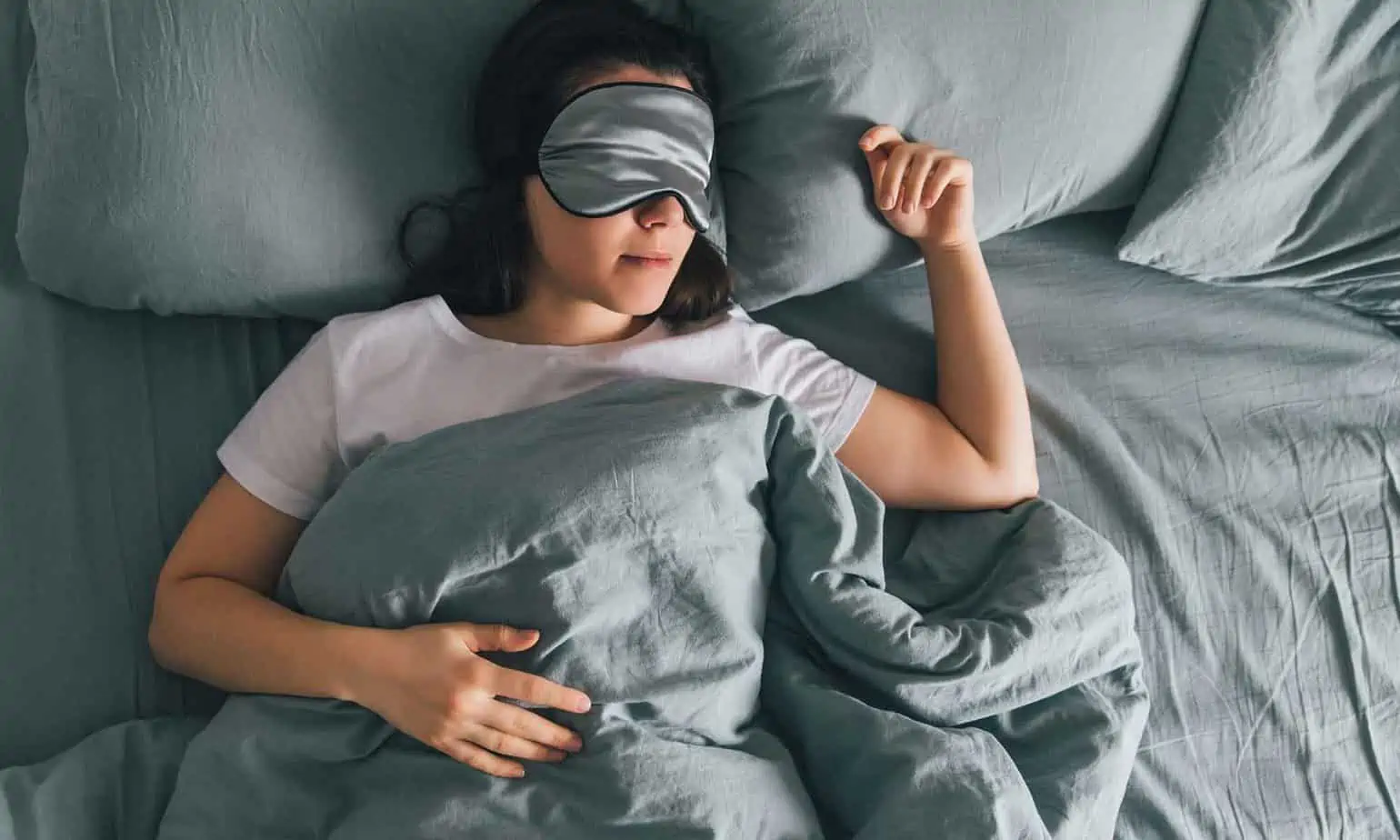Getting a good night’s rest is crucial as sleep plays a big role in your mental, physical, and emotional well-being. “Disruption in sleep patterns can take a toll on the body and mind, placing people at a higher risk for anxiety and depression as well as negatively impacting the immune system,” says Ashley McGee, Vice President of Nursing at Mountainside. Poor sleep habits can also manifest into other serious issues such as heartbeat irregularity, type 2 diabetes, or increased risk of stroke.
However, getting quality sleep isn’t always easy. If you spend the night constantly tossing and turning or waking up over the slightest nuisance, then you are not alone. Lack of sleep is an issue for 50 to 70 million Americans of all ages and socioeconomic backgrounds.
The good news is that making simple lifestyle changes may be all that you need to start falling asleep faster and wake up feeling more rested. Find out what is keeping you up at night and how to get the better sleep you deserve.

1. Eating Habits
Everyone knows that drinking coffee before bed isn’t a good idea, but caffeine isn’t the only thing that affects your ability to sleep. Eating fatty or sugary foods can result in shorter sleeping durations and more disruptions. Other eating and drinking habits play a role, too.
- Avoid eating heavy meals before bedtime. Eating a lot right before you go to bed can leave you feeling stuffed, making it difficult to find a comfortable position to fall asleep in. This is particularly true if you suffer from acid reflux, which is when stomach acid creeps up into your esophagus. If you struggle with acid reflux, stay away from spicy or acidic foods at night.
- Don’t skip dinner. While eating a heavy meal before going to sleep isn’t good, neither is going to bed hungry. Hunger pangs can cause restless sleep and even cause you to wake up in the middle of the night. Don’t ignore your hunger cues and enjoy a nutritious snack if you’re worried about going to bed on an empty stomach.
- Eat more sleep-inducing foods. Kiwis, cherries, bananas, nuts, and spinach are not only healthy pre-bedtime snack options, they also have plenty of sleep-inducing nutrients like melatonin, tryptophan, and omega-3s. These nutrients attach to receptors in the brain to reduce nerve activity and signal that it’s time to sleep.
- Stop drinking water two hours before bedtime. Staying hydrated is important for your overall health, but drinking water right before you go to sleep can cause you to wake up throughout the night to use the bathroom. These disturbances in your sleep cycle can leave you feeling tired the next day.
2. Environment
At the end of a long day, your mind and body need to unwind. But if you are in an environment surrounded by distractions such as light or noise, you will have a more difficult time falling into a deep slumber, also known as REM (Rapid Eye Movement) sleep.
To create calm and relaxation in your nighttime routine, you should consider changing certain elements of your bedroom.
- Block out the light. Studies show that light can suppress your body’s production of melatonin, which regulates sleep. To reduce your exposure to artificial light, stop using your phone, computer, and television at least one hour before your bedtime. If that’s not possible, consider getting tinted glasses designed to block out blue light. If your bedroom gets a lot of light from streetlamps, consider investing in blackout curtains or using a sleep mask.
- Find your perfect temperature. If your bedroom is too cold or too hot, you’re more likely to wake up throughout the night. To avoid this, maintain your bedroom at a comfortable temperature. Studies show that keeping your thermostat between 60 and 68 degrees is ideal, but everyone is different, so it’s important that you find the temperature that is right for you.
- Buy a few soothing plants. Keep some plants in your room not just for decoration, but also to create a relaxing atmosphere. Plants Certain plants are also popular for their stress-reducing qualities. Some of these include jasmine, lavender, areca palm, and English ivy.
- Declutter your room. A messy room can lead to a busy mind. Seeing clutter before going to bed can cause anxiety about all the unfinished tasks you have to complete tomorrow. By keeping your room organized, you can unwind in the peaceful environment that your brain needs to recharge. Start decluttering by putting away your clean clothes, only keeping essentials on your nightstand, and taking a minimalistic approach to décor.
- Turn your bed into your oasis. Comfort is important when it comes to sleep. If you’ve had your mattress for years and it’s filled with lumps or leaves you with a sore back, get rid of it. Invest in a high-quality mattress as well as some comfortable pillows and plush blankets to create the perfect bed and help you catch some Z’s.
3. Electronics and Social Media
As tempting as it might be to watch your favorite Netflix show or scroll through social media before bedtime, electronic devices can suppress your body’s natural melatonin production, which is a hormone that causes your body to wind down and prepare for sleep. On top of that, social media keeps your brain stimulated, and can stress you out depending on what kind of content you are viewing (i.e. a sad animal video, a heated debate on Twitter, or a group chat with friends).
Here is what you can do instead of using devices before bed:
- Do some light stretching. Doing a few stretches before bed can loosen muscles, relieve any tension, and build a stronger mind-body connection. Over time, stretching regularly can help you gain a more functional range of motion. Here are a few stretches to get you started.
- Take a warm bath or shower. This seems like a self-explanatory one but soaking yourself in warm water after a long day can help your mind start to wind down. A warm bath can raise your body temperature, and the subsequent drop as you cool down after the bath can mimic this natural process, signaling to your body that it’s time to rest.
- Drink bedtime tea and read. Many teas promote good sleep such as chamomile, lavender, lemon balm, and passionflower. Reading has also been shown to improve sleep and decrease stress. A 2021 online study found that 42 percent of people slept better when they read a book before bed and readers also sleep longer than non-readers. You can combine these for a restful sleep.
- If you must use your phone, be mindful of certain things. Whether you are talking to a friend before you fall asleep or trying to finish an urgent project, unplugging from your phone may not be possible. In such cases, use nighttime mode to reduce blue light emissions. Limit scrolling on social media or use a wellness app such as “Calm” or “Noom.”
4. Poor Mental State
Feelings of depression, anxiety, worry, or stress can keep your mind racing all night long. Caring for your mental health will not only help you sleep better but will also improve your overall well-being.
- Get to the root of the issue. Do some emotional exploration and discover what is causing your internal struggles. You can try doing this by writing down your feelings in a journal, talking to yourself in the mirror, speaking with someone you trust, or reaching out to a therapist for professional insight.
- Meditate. While it can be intimidating at first, even just five to ten minutes of daily meditation can send you into a deep slumber. When you meditate, you remain in the present moment instead of constantly mulling over past and future events. Try out a meditation class or check out the countless videos online to get a general understanding of this holistic practice.
- Practice self-care. Make time in your daily schedule to do something for yourself. You can read a book, spend time in a garden, take a bath, or cook your favorite meal. Treating yourself kindly can help you grow your confidence and self-worth and clear your mind before heading to sleep.
Whether you are constantly waking up in the middle of the night or having trouble falling asleep, these issues can harm your health down the road. Take a closer look at your sleep habits and decide where you can implement change. Learning about the things that are keeping you up at night and better sleep practices will help you feel more prepared to tackle anything that comes your way.
If you or a loved one is struggling with addiction, Mountainside can help.
Click here or call (888) 833-4676 to speak with one of our addiction treatment experts.

 By
By 







